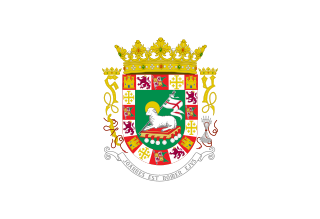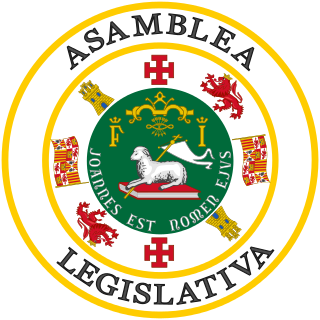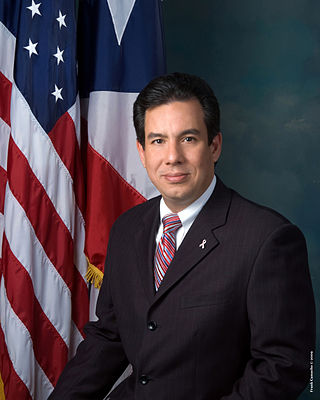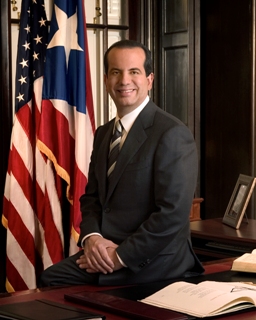
The politics of Puerto Rico take place in the framework of a democratic republic form of government that is under the jurisdiction and sovereignty of the United States Congress as an organized unincorporated territory. Since the 1898 invasion of Puerto Rico by the United States during the Spanish–American War, politics in Puerto Rico have been significantly shaped by its status as territory of the United States. The nature of Puerto Rico's political relationship with the United States is the subject of ongoing debate in Puerto Rico, in the United States, the United Nations and the international community, with all major political parties in the archipelago calling it a colonial relationship.

The Foraker Act, Pub. L.Tooltip Public Law 56–191, 31 Stat. 77, enacted April 12, 1900, officially known as the Organic Act of 1900, is a United States federal law that established civilian government on the island of Puerto Rico, which had recently become a colony of the United States as a result of the Spanish–American War. Section VII of the Foraker Act also established Puerto Rican citizenship. President William McKinley signed the act on April 12, 1900 and it became known as the Foraker Act after its sponsor, Ohio Senator Joseph B. Foraker. Its main author has been identified as Secretary of War Elihu Root.

The government of the Commonwealth of Puerto Rico is a republican form of government with separation of powers, subject to the jurisdiction and sovereignty of the United States. Article I of the Constitution of Puerto Rico defines the government and its political power and authority. The powers of the government of Puerto Rico are all delegated by the United States Congress and lack full protection under the U.S. Constitution. Because of this, the head of state of Puerto Rico is the President of the United States.
The posts of shadow United States senator and shadow United States representative are held by elected or appointed government officials from subnational polities of the United States that lack congressional vote. While these officials are not seated in either chamber of Congress, they seek recognition for their subnational polity, up to full statehood. This would enfranchise them with full voting rights on the floor of the US House and Senate, alongside existing states. As of 2021, only the District of Columbia and Puerto Rico currently have authorized shadow delegations to Congress.
Commonwealth is a term used by two unincorporated territories of the United States in their full official names, which are the Northern Mariana Islands, whose full name is Commonwealth of the Northern Mariana Islands, and Puerto Rico, which is named Commonwealth of Puerto Rico in English and Estado Libre Asociado de Puerto Rico in Spanish, translating to "Free Associated State of Puerto Rico." The term was also used by the Philippines during most of its period under U.S. sovereignty, when it was officially called the Commonwealth of the Philippines.

The governor of Puerto Rico is the head of government of the Commonwealth of Puerto Rico, and commander-in-chief of the Puerto Rico National Guard.

Antonio Rafael Barceló y Martínez was a Puerto Rican lawyer, businessman and the patriarch of what was to become one of Puerto Rico's most prominent political families. Barceló, who in 1917 became the first President of the Senate of Puerto Rico, played an instrumental role in the introduction and passage of legislation which permitted the realization of the School of Tropical Medicine and the construction of a Capitol building in Puerto Rico.

The Senate of Puerto Rico is the upper house of the Legislative Assembly of Puerto Rico, the territorial legislature of Puerto Rico. The Senate, together with the House of Representatives of Puerto Rico, control the legislative branch of the government of Puerto Rico.

The House of Representatives of Puerto Rico is the lower house of the Legislative Assembly of Puerto Rico, the bicameral territorial legislature of Puerto Rico. The House, together with the Senate, control the legislative branch of the government of Puerto Rico.

The Legislative Assembly of Puerto Rico is the territorial legislature of the Commonwealth of Puerto Rico, responsible for the legislative branch of the government of Puerto Rico. The Assembly is a bicameral legislature consisting of an upper house, the Senate normally composed of 27 senators, and the lower house, the House of Representatives normally consisting of 51 representatives. Eleven members of each house are elected at-large rather than from a specific legislative district with all members being elected for a four-year term without term limits.

Luis Guillermo Fortuño Burset is a Puerto Rican politician who served as the governor of Puerto Rico, an unincorporated territory of the United States, from 2009 to 2013.

The Jones–Shafroth Act —also known as the Jones Act of Puerto Rico, Jones Law of Puerto Rico, or as the Puerto Rican Federal Relations Act of 1917— was an Act of the United States Congress, signed by President Woodrow Wilson on March 2, 1917. The act superseded the Foraker Act and granted U.S. citizenship to anyone born in Puerto Rico on or after April 11, 1899. It also created the Senate of Puerto Rico, established a bill of rights, and authorized the election of a Resident Commissioner to a four-year term. The act also exempted Puerto Rican bonds from federal, state, and local taxes regardless of where the bondholder resides.

Kenneth Davison McClintock-Hernández is a politician who served as the twenty-second Secretary of State of Puerto Rico, one of the four longest serving in that post. McClintock served as co-chair of Hillary Clinton’s National Hispanic Leadership Council in 2008, he co-chaired her successful Puerto Rico primary campaign that year and served as the Thirteenth President of the Senate of Puerto Rico until December 31, 2008. He chaired Luis Fortuño’s Incoming Committee on Government Transition in 2008 and the Outgoing Committee on Government Transition in 2012, the only Puerto Rican to serve in both capacities. He was sworn into office as secretary of state on January 2, 2009, by Chief Justice Federico Hernández Denton, fulfilling the role of lieutenant governor in the islands.

The Jones Law was an Organic Act passed by the United States Congress. The law replaced the Philippine Organic Act of 1902 and acted as a constitution of the Philippines from its enactment until 1934, when the Tydings–McDuffie Act was passed. The Jones Law created the first fully elected Philippine legislature.

Pedro Rafael Pierluisi Urrutia is a Puerto Rican politician and lawyer currently serving as governor of Puerto Rico since 2021. He has previously served as secretary of justice, resident commissioner, acting secretary of state, de facto governor of Puerto Rico and as private attorney for Puerto Rico's fiscal oversight board under the Puerto Rico Oversight, Management, and Economic Stability Act.

Manuel A. Torres-Nieves, Puerto Rico's longest-serving secretary of the Senate of Puerto Rico in modern times, first served during the tumultuous years of 2005–2008 in which the Senate was controlled by the pro-statehood New Progressive Party (NPP) while the governorship had been controlled by the pro-status quo Popular Democratic Party, served a second consecutive term as Senate Secretary after having served as Acting President of the Senate from January 1–12, 2009, between the Senate presidencies of Kenneth McClintock and Thomas Rivera Schatz. He then served as Puerto Rico's first Electoral Comptroller before his third election as secretary of the Senate during Rivera Schatz' historic second non-consecutive term as Senate President, which ended January 11, 2021. On March 11, 2021, Governor Pedro Pierluisi nominated him as Comptroller of Puerto Rico, a constitutional role which requires the advice and consent of both the Senate and the House of Representatives.

The secretary of state of Puerto Rico leads all efforts that promote the cultural, political, and economical relations between Puerto Rico and foreign countries, and other jurisdictions of the United States. The post was created by Article IV of the Constitution of Puerto Rico which merely establishes that the secretary serves as acting governor when the governor is unable to perform his duties—a post similar to that of a lieutenant governor in U.S. politics. In recent times, however, the post has evolved into one similar to that of a foreign minister. Today, the secretary is the officer in charge of Puerto Rico's foreign relations, albeit under the consent of Congress or the U.S. Department of State due to Puerto Rico's political status.

A lieutenant governor is an official in state governments of 45 out of 50 of the United States. In most cases, the lieutenant governor is the highest officer of state after the governor, standing in for that officer when they are absent from the state or temporarily incapacitated. In the event a governor dies, resigns or is removed from office, the lieutenant governor typically becomes governor.

The 2012 United States elections took place on November 6, 2012. Democratic President Barack Obama won reelection to a second term and the Democrats gained seats in both chambers of Congress, retaining control of the Senate even though the Republican Party retained control of the House of Representatives. As of 2022, this is the most recent election cycle in which neither the presidency nor a chamber of Congress changed partisan control, and the last time that the winner of the presidential race provided coattails for their party in both the House of Representatives and the Senate.

Aníbal Salvador Acevedo Vilá is a Puerto Rican politician and lawyer. He served as the governor of Puerto Rico from 2005 to 2009. He is a Harvard University alumnus and a graduate of the University of Puerto Rico School of Law, where he obtained his Juris Doctor degree. Acevedo Vilá has held various public service positions in the Puerto Rico government under the Popular Democratic Party, serving as a member of the House of Representatives of Puerto Rico (1993–2001) and as the 17th Resident Commissioner (2001–2005), before he was sworn in as Governor on 2 January 2005. Acevedo Vilá was also a member of the National Governors Association, the Southern Governors' Association and the Democratic Governors Association, and a collaborator of President Barack Obama's presidential campaign. Also he is currently an adjunct professor of the University of Puerto Rico School of Law. He unsuccessfully ran for Resident Commissioner of Puerto Rico in the 2020 elections for the Popular Democratic Party.














